Rob Nunn's Blog: Interesting Though Elementary, page 8
January 29, 2023
The New Dance Was in This Form [DANC]
I like Sherlock Holmes. My daughter likes dance. So when I saw that a new dance performance called "My Dear Watson" was playing in St. Louis, it seemed like a match made in heaven.
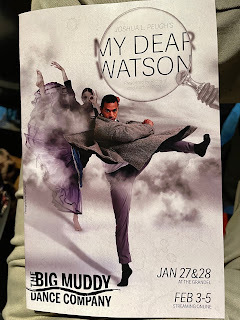
Except that my daughter isn't too interested in Sherlock Holmes and I don't understand modern dance.
The Big Muddy Dance Company's performance closed those gaps for us, though. "My Dear Watson" is a brand new, 90 minute piece created by Joshua L. Peugh and I had no idea what to expect. I'm not a widely cultured person, but I like to keep an open mind. And I'm glad that I did because this was a fun show.
It took me a bit to figure out how modern dance pieces work. Why were Holmes and Watson dancing so closely? How can you tell a mystery story if there's no dialogue? Why do characters who are dead keep getting up and dancing some more?
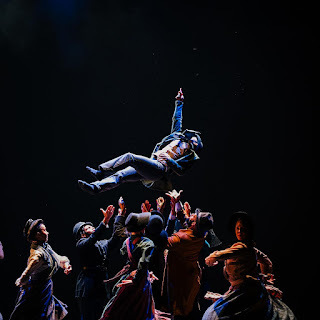
This may be a big "duh" moment for folks who get to theater performances more than I do, but I soon realized that when people are dancing together, that is showing that they are talking to one another. The dead people keep getting up and dancing because the audience is seeing Holmes deduce the events in his investigation. And how does a mystery work without dialogue? It's elementary: the story is told through dance.
If you're the type of person who scoffs at new takes on old stories, pass on this performance. But if you're open-minded when it comes to adaptations, "My Dear Watson" is definitely worth checking out. The show only ran for two nights in St. Louis this weekend, but it will be available to stream on February 3-5 at www.thebigmuddydanceco.org/mydearwatson
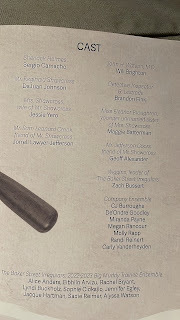
One thing I really liked about this performance is that it is a brand new story. No retreads of the classic tales and no reworking of old characters into a new mystery. (Thank God Adler and Moriarty weren't trotted out for another go round.) "My Dear Watson" is a straight forward murder mystery that shows what these performers can do.
So let's talk about some of the performances.
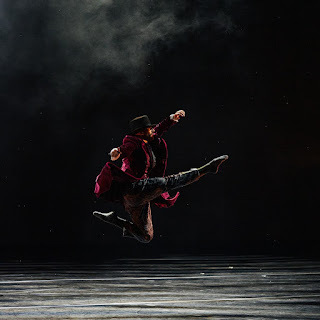
Sherlock Holmes is played by Sergio Camacho and Will Brighton is John Watson. These two bring different energies to their roles, but when they are performing together, it's flawless. Brighton has a few dance numbers on his own and you can almost feel Dr. Watson's Victorian prose flowing from his poised moves. Camacho really gets to shine when he is investigating crime scenes, and you can see the manic energy in his eyes as he moves all around.
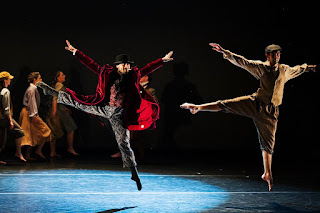
The Baker Street Irregulars show up for two scenes in the second act, and this group brought a whole new energy to the stage. You don't expect much "fun" in a show full of murder, but this group provided it for sure. And watching Sherlock interact with them brought out a new side to his character that the audience hadn't seen up until this point.
Another standout performance was Jessie Yero, who plays Mrs. Shawcross. Yero evoked emotion every time she was on stage and was the character my daughter and I talked about the most on the drive home.
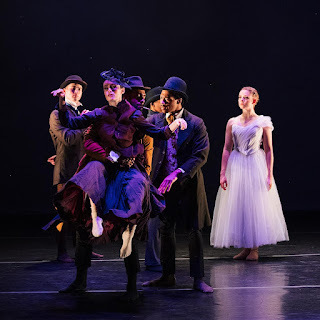
But the pieces I enjoyed the most were the big ensemble numbers. When you've got twenty or so highly talented dancers on stage, it's amazing how well a story can be told with just movement. And some of the moves these people pulled off? If I even thought about some of those positions I'd pull a muscle. Someone else could describe it much better than I could, but let me just say - wow.
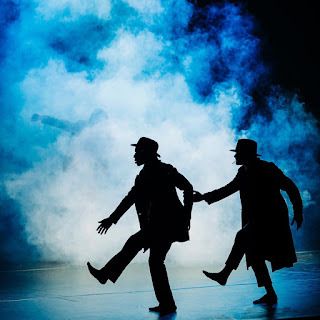
The stage presence of everyone involved added a lot to the show as well. Scenes set outside were always foggy. The cast moved through the aisles and front rows during numbers and milled about on the stage to set the mood before the show started. And the costumes were fantastic. I'm pretty sure Sherlock's pants alone are worth the price of admission. If you've ever wondered what Benedict Cumberbatch's wallpaper would look like as a pair of trousers, "My Dear Watson" has answered that for you.
Did "My Dear Watson" make me want to run out and buy season tickets to all of the dance companies in St. Louis? Not quite. But did it make for a fun Sherlockian evening? You bet. If you're at all interested in seeing Sherlock Holmes in a new way, I recommend checking out the streaming performances on February 3-5.
January 15, 2023
Interesting Interview: Nicholas Meyer
Very few people can claim to be responsible for a Sherlockian revolution. Benedict Cumberbatch, Jeremy Brett, and Basil Rathbone of course. But this week's Interesting Interview may be one of the only non-actors who can say that.
Nicholas Meyer's novel, The Seven-Per-Cent Solution, brought Holmes back to the forefront of public consciousness. That book stayed on the bestseller list for the better part of a year and was later turned into an Academy Award nominated movie. But Nicholas isn't a one-trick pony. He's since written four more Sherlockian pastiches in between his massive screenwriting career. (The guy's impressive; just check his website for a full list.) So what are his thoughts on our hobby? Keep reading to find out!

How do you define the word “Sherlockian”?
I am not aware of any official or accepted definition of the term Sherlockian. I know, for example, that in the UK, the word is generally Holmesian. I take it both terms imply affection and enthusiasm for stories involving Holmes, Watson and their world.
How did you become a Sherlockian?
I was introduced to the Holmes stories by my father when I was about eleven years old. An enthusiast himself, he gave me the complete one volume edition, edited by Christopher Morley. My recollection is that I gobbled them up avidly, (though I was certainly perplexed by A Study in Scarlet when I turned the page and found myself in Utah with a whole series of different characters!)
What is your profession and does that affect how you enjoy being a Sherlockian?
My profession is Storyteller. I write novels but also screenplays for film and television and direct same. In my world - at least so far - there is no such thing as retirement. There's no weekends, no holidays as such and no vacations. It's all about narrative. I look forward to dying in harness.
What is your favorite canonical story?
It is very hard for me to pick one favorite Holmes story. I number "The Devil's Foot," "The Bruce Partington Plans," "Silver Blaze" and "The Red-Headed League" among my favorites, and I'm partial to "The Yellow Face," which shows that Holmes could fail - that fact, I think, makes him the more real.
Who is a specific Sherlockian that you think others would find interesting?
I have always enjoyed reading the works of Michael Harrison and also Trevor Hall.
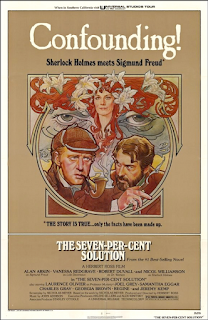
What subset of Sherlockiana really interests you?
There was a time when I really enjoyed reading "the writings about the writings," especially when I originally discovered their existence and they fueled my enthusiasm for writing my own Holmes tale, The Seven-Per-Cent Solution. I've since acquired a small library about Holmes, Watson and their world, though that use has now been put to use in researching my subsequent Holmes stories, The West End Horror, The Canary Trainer, The Adventure of the Peculiar Protocols, The Return of the Pharaoh and the forthcoming, Sherlock Holmes and the Telegram From Hell.
Writing my own Holmes adventures has proved my most enjoyable pastime. I learn by doing, about Holmes, his world, but also about myself in relation to Holmes. Over the years I've discovered an obscure kinship between myself and the detective, not, I hasten to add, in terms of talent or achievement, but rather - I tell myself - in terms of sensibility. Values, if you like. In sum, Holmes allows me to express myself.
What is your process for writing a new Sherlock Holmes story?
It is very difficult to describe the creative process - mine, for sure. The first thing that must happen is that I must stumble on an idea that simply won't let go, an idea that to my mind is a natural for Holmes. Once I am seized by that idea, there follow weeks or months of playing in my head with how Holmes could be integrated into the idea - or vice versa. I take notes, I do research. Sometimes I wind up abandoning the project altogether; it wasn't as promising as I thought - or I wasn't good enough to lick it.
Assuming I don't abandon the project, after that, it's much harder to describe: you're at your desk, you're in a state of flow, you look up, it's hours later, and you don't quite know where you've been. I think that trance-like state applies to a lot of creativity, not just writing and not just writing Sherlock Holmes. When people ask me "how I do it" I can truthfully answer, "I don't know."
The Seven-Per-Cent Solution has widely been credited for creating a resurgence in Sherlock Holmes. If you had known that during the writing of that novel and movie, would you have done anything differently?
I write the books I would like to read. I don't think I would have done anything differently if I'd been told The Seven-Per-Cent Solution was going to spark a resurgence of interest in Holmes.
What book would you recommend to other Sherlockians?
Aside from Doyle's originals, I tend to recommend my five Sherlock Holmes novels. Typically I don't read Holmes books by other authors, probably because I worry they might be better than mine! Thus - The West End Horror, The Canary Trainer, The Adventure of the Peculiar Protocols and The Return of the Pharaoh. I have a sixth Holmes novel in the works, Sherlock Holmes and the Telegram from Hell.
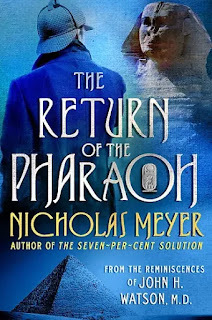
Where do you see Sherlockiana in 5 or 10 years from now?
Truthfully I have no idea where Holmes will be in the future; I've no idea where WE will be in the future. Prognostications are notoriously faulty. The only thing Star Trek seems to have got right are the flip top cell phones.
January 11, 2023
A Brief Review of What had Passed [CREE]
The BSI Birthday Weekend has come and gone. I'm a few days past it and hoping to catch up on my sleep some time soon. A ton of events took place over those days, many of which I was able to attend and enjoy, but some I had to miss. So here is a recap of one Sherlockian's weekend in New York:
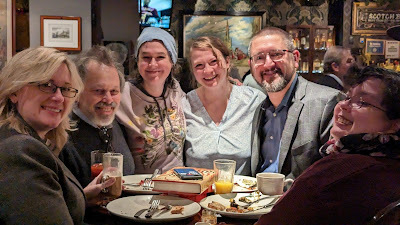
Thursday
When I first booked my flight, a 6:30 am departure time seemed like a good idea. But waking up at 4 am that morning made me question my decision-making skills. I did learn that I can sleep sitting up and in a mask, so the flight went smoothly.
I arrived at the Westin Hotel and dropped my luggage off. Rusty Mason and I headed to Times Square to get tickets to a Broadway show for that night. I don't know why, but I was fascinated by the knockoff costumed characters walking around. I'm pretty sure I was in better shape than Captain America that day.
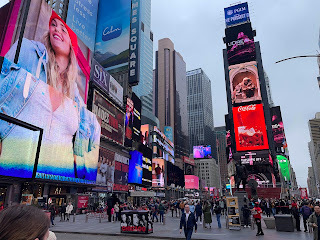
One place I've always wanted to see in New York was McSorley's. It has a great tie to Christopher Morley, and the more I read from him, the stronger the pull has gotten. So I was delighted to be able to meet up with plenty of folks in the back room for lunch that day.

After nodding off in my room, I almost missed my first weekend event, the Wessex Press cocktail hour! I made it to the Algonquin Hotel only a little late and was able to connect with some great people. Then it was dinner with Chris Zordan, Crystal Noll, Heather Holloway, and Michael Stallings, and finally off to the bright lights of Broadway.
We got amazing seats to see Kimberly Akimbo. Even though Tiffany Knight recommended it, the description didn't really grab my attention. So I was expecting a Comedy Central style show with some songs throughout. You guys. Let me tell you, that I was cracking up for the first half of the show and the second act made my heart so full it could've burst. A fantastic show.
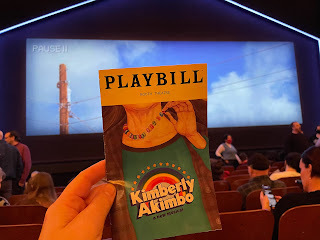
As is the wont of Sherlockians, everyone made it to a bar from their various locations. The old hangout, O'Lunney's, was a casualty of Covid, but a great pub two blocks from the Westin filled the space very nicely. Rosie Dunn's was taken over every night by our group, and it was clear that the bartenders appreciated us.
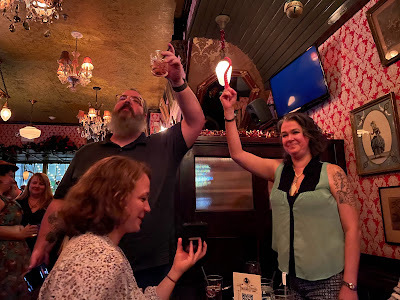
Friday
Friday was a day full of eating. The morning kicked off with a class reunion for my investiture class at the Red Flame Diner. People have gone on and on about this place for years but I've never been. So I was interested to see what the big deal was. I think there's a lot of nostalgia in all of the descriptions I've heard. It's a diner. Our 11 classmates were spread out over three booths, so while I was able to reconnect with Tim Johnson, Laurence Delosian, and David Humphrey at my table, it wasn't set up for a large group.

It was then time for the William Gillette Luncheon, hosted seamlessly by Shana Carter. This was a tabled event, and I'm always excited to see who I get to sit by at this. I was lucky enough to sit with Pj Doyle, Beth Gallego, and Michael Stallings. Lee Shackleford and Tiffany Knight staged Gillette's short Sherlock Holmes production. While not the play that made Gillette synonymous with Sherlock Holmes, this one was perfect for the venue and handled by great performers.
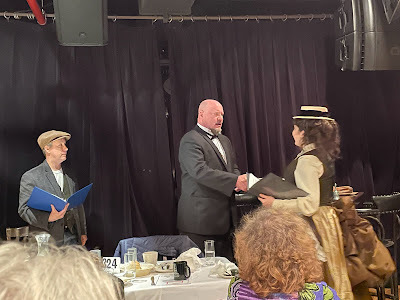
A few brave souls decided to walk down almost to the Hudson River to see a plague commemorating Nero Wolfe's brownstone from the entertaining mystery series written by Rex Stout. Mike McSwiggin, Max Magee, David Marcum and I hoofed across town. I've become a huge Nero Wolfe fan over the past few years and was excited to see the neighborhood, but man did my feet hate me by the end of that walk!
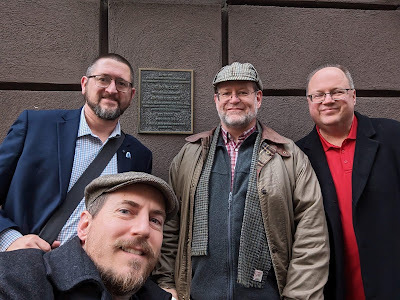
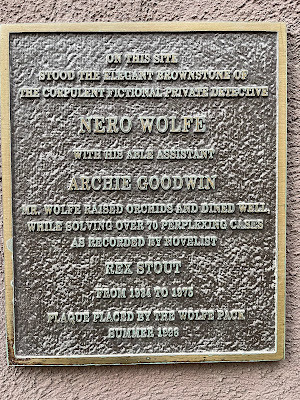
And then it was time for the BSI Dinner. The men were in black tie and the women in their best dresses for a formal evening together. A recap of all of the night's toasts and talks will be in an upcoming issue of the Baker Street Journal, so I will save you from my ramblings. This is the night when everyone enjoys the cocktail hour beforehand and a great dinner follows.
Of course, everyone is waiting for the investitures to be announced that night and this year's class included some great people. I was so excited to see Cindy Brown and David Harnois finally get their investiture shillings. Another overdue name was Dore Nash, a New York Sherlockian who hadn't been invited to a dinner in over twenty years. But her first year back? A shilling for her as well! A lot of folks over the weekend had good things to say about Michael Kean's tenure as Wiggins of the BSI, and his investiture choices continue to make many people happy.
Jacqueline Morris sat next to me and wrote down all of the names called and their investitures, which I promptly texted to Brad Keefauver as soon as the dinner was over so he could share the announcements with everyone at the virtual event happening that night. Lots of folks were celebrating for their friends that night!
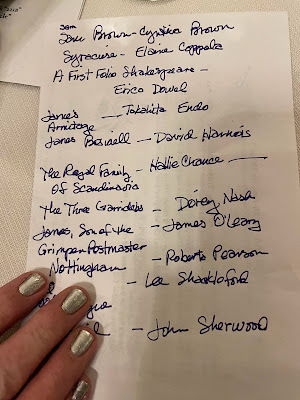
And the celebrating continued in a big way back at Rosie Dunn's after the dinner. The bar was filled with folks who were genuinely happy for everyone who was recognized and we were even happier to be in the company of our friends that night. The group got so big that we had to spill over into their upstairs room! So many stories and toasts were shared that it would take a book to capture them all. I could tell you about the older Sherlockian who decided to strip his shirt off outside on a January night, or about the sober Sherlockian who woke up Saturday morning to find that his bathtub had been puked in by his roommate, but those are tales for another time...
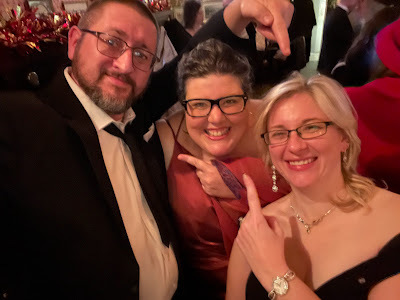
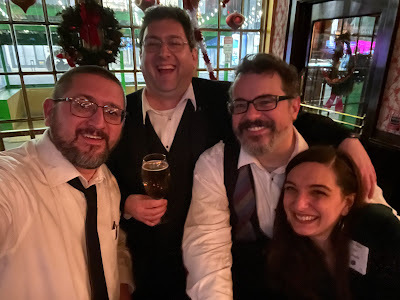
Saturday
The Dealers' Room on Saturday morning is always a highlight. New releases from BSI Press and Wessex Press are the big news, but other publishers such as Belanger Books and MX Publishing are on hand as well. And you can count on plenty of second-hand books and custom-made items for sale. If you can walk out of the Dealers' Room without spending over a hundred dollars on books, you have more self-control than I do!
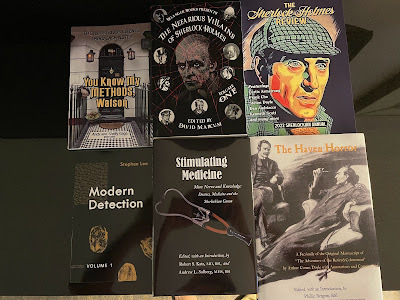
Saturday's only official event is the BSI Luncheon. It's amazing how two events held in the same room just a few hours apart can have such different vibes. The BSI Dinner on Friday night is a formal and elegant affair. The next afternoon is full of everyone floating around from table to table to visit with friends and enjoy a great buffet lunch.
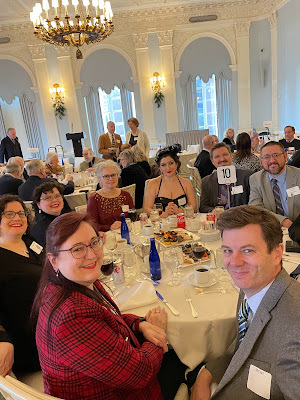
Greg Ruby coordinated a small happy hour at a bar after the luncheon. All kinds of folks visited for a little or a lot during the afternoon, all in a relaxed and friendly atmosphere. In fact it was so relaxed, that two separate people actually fell asleep hanging out on those couches. This weekend will really take a lot out of you!
Saturday night is full of small get-togethers at restaurants around the city and Lost in New York with a Bunch of Sherlockians for everyone else who is looking for a crowd. David and I didn't have it in us to do any of those things so when we left the happy hour, we grabbed Subway and ate back at the hotel room. I was actually able to eat dinner in Manhattan for ten dollars!
A few hours of rest and a few drinks in the Westin bar preceded another night at Rosie Dunn's. While a smaller crowd than Friday's overflowing group, Saturday still offered plenty of time for drinks with friends until closing time.

Sunday
My favorite part of the BSI Weekend has always been the ASH Brunch on Sunday. Completely relaxed and full of good breakfast foods, this final event is like the last day of summer camp. Everyone who didn't make an early exit from the city gets together one last time for catching up and talking about the year ahead. In all of my previous trips to New York, I've had to leave about halfway through to catch my flight. This year I was lucky enough to have an evening flight so I was able to be one of the last ones at the party. When it's just you, the locals, and the stalwarts staying until Monday, you can really feel like you've made it to the end of the weekend.
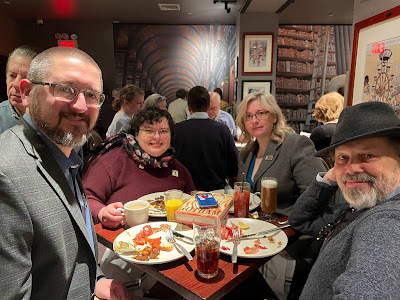
Even the walk back to the hotel after the ASH Brunch feels different. It's Sunday afternoon in NYC. The crowds on the sidewalk seem to move at a more relaxed pace. No one is hustling to the office or an appointment. And that final walk always takes me past the New York Public Library, a piece of gorgeous architecture that makes me smile just thinking about it.
After an Uber to the airport and enjoying the hustle and bustle of life swirling around me one last time, I was happy to board my flight back to St. Louis where my family and real life await. The BSI Weekend is four days of excitement and exhaustion, and I'm already looking forward to the 2024 Weekend.

December 11, 2022
Interesting Interview: Nick Martorelli
Nick is the Headmaster of The Priory Scholars of NYC and a spark plug sure to ignite anyone's Sherlockian energy. He's been featured in I am Lost Without My Boswell , Scintillation of Scions, The Monstrum Opus of Sherlock Holmes , and The Baker Street Journal - quite a diverse collection! And you'll find in the answers below that Nick contains multitudes. So whether you've known him for years or this is your first introduction, I think you'll really enjoy this week's Interesting Interview with Nick Martorelli!
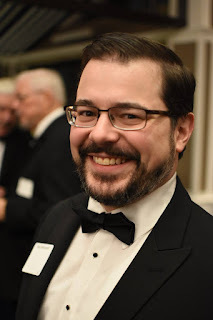
How do you define the word “Sherlockian”?
Starting off with the hard question, I like it. One can be a fan of Sherlock Holmes in many ways, but I believe that to be a "Sherlockian" requires one's prime relationship to be with the original works by Sir Arthur Conan Doyle. That relationship can be whatever one prefers or desires, but any appreciation, contemplation, or critique must always incorporate Conan Doyle. There are sub-classes of Sherlockians who are interested in specific aspects of that relationship - historians, researchers, chronologists, "This Fake Place was Actually This Real Place"-eans, biographers; and Sherlockians can have many favorite part of the Holmes legacy - pastiches, collectibles, film adaptations, comic books. But to be a Sherlockian is to root oneself within the original stories.
How did you become a Sherlockian?
I first found the Sherlock Holmes stories in 7th grade, but I don't think of my Sherlockian career beginning until high school, when I started buying the pastiches that were being published (and re-printed). I was a big fan of the Star Trek novels, or the Star Wars EU, and when I saw collections of new Sherlock Holmes stories, I filled a bookshelf with them. Most of the collections were short stories, but a few of them included a scholarly essay that analyzed the stories, or made reference to the BSI.
Eventually, I stumbled across Starrett's The Private Life of Sherlock Holmes in my local library, and it was full speed ahead from there. Even though my interests have shifted, I still have a lot of those pastiches from high school. I even kept a formatted bibliography of them, so that - in the days before smartphones - I knew which books I owned.
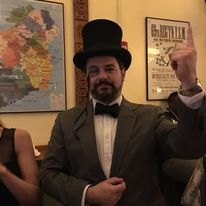
What is your profession and does that affect how you enjoy being a Sherlockian?
I work in book publishing and studied English Literature, and those elements both influence my favorite approach to understanding the Canon - as fictionalized literature meant for a paying audience. Whether John Watson or Arthur Conan Doyle wrote the stories, they were written as entertainment, so they must be analyzed and reviewed under that premise. I find most literature pointing out "errors" in the Canon to be uninteresting - Watson openly tells us that he is inventing names and mis-representing facts, so why do Sherlockians feel proud to catch him in lies he himself has admitted to? The stories never pretend to be historical accounts or journalism; Watson crafts narratives, Conan Doyle spins yarns, and that's the standard we should hold them to. For me, it is the most interesting way for me to read the stories.
What is your favorite canonical story?
"The Six Napoleons." The top five are usually variable, but this one stays at the top. It has everything I want in a Sherlock Holmes story - a unique mystery, clever deductions, suspense and drama - and it highlights Sherlock's relationship with Watson, as well as his friendship with Lestrade. Top to bottom, it's an absolute banger.
Who is a specific Sherlockian that you think others would find interesting?
I come away from every conversation with Ray Betzner wishing we could have talked for longer, even when the talk is about non-Sherlockian things.
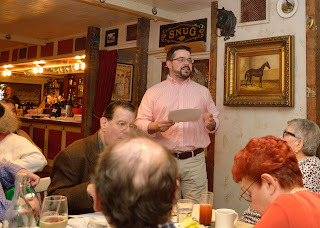
What subset of Sherlockiana really interests you?
I mentioned the specific "Canon as Literature" readings above, as well as my own early fascination with pastiches. (I do consider them Sherlockian - the writers are engaging with the prose of Conan Doyle, whether they chose to honor his style or not.)
These days, I find myself interested in Sherlockian games - how does a designer capture the spirit of the Canon in a board game or card game? I've also been having a lot of conversations about the future of scion societies, scholarly conferences, and (near-)scholarly conferences. How do we, as Sherlockians, interact?
But if I'm honest, the part of Sherlockiana that is always at the top of my list is textual analysis of the stories themselves - so many other things exist, and I truly could do without all of them.
You've spoken on Irene Adler a few times, once at a BSI Dinner and another time comparing her to Boba Fett. Why do you think she looms so large in Sherlockian minds?
Sherlock Holmes, let's be honest, has a terrible rogues gallery. Villains appear in single stories, there is no arc to any of the confrontations, and most are forgotten as soon as the story is over. Most adaptations of the Canon tease out the Holmes vs Moriarty dynamic into something far more dramatic that Conan Doyle intended - which is great and fun and can be very interesting, but there's no arguing that it's acanonical to have Holmes confronting Charles Augustus Milverton more than once. So in this franchise, a female antagonist like Irene Adler looms large, and that interest is emphasized by the fact that she is one of the only antagonists who outwits Sherlock Holmes. She has a lot of interesting qualities in "A Scandal in Bohemia," but it's the qualities she takes on in every subsequent adaptation that earned her the promotion into the main cast of the canon.
You may have the most energetic personality of any Sherlockian I know. What gets you so excited about this hobby?
You flatter me! It might sound like a cliché, but my favorite thing about this hobby are the 60 stories by Sir Arthur Conan Doyle. For tales that might seem so straightforward, the stories are top-notch. They are nuanced, brilliant, reflective of each other, and the time in which they were written. In them, you can chart the changes in society, in the Holmes/Watson relationship, in technology, even in what "good writing" is. Readers can watch the author develop a character, struggle with it, return to previous ideas and rework them - all within tightly written adventures you can read in a single sitting.
It's hyperbole to say that anything you can say about Shakespeare you can say about Conan Doyle, but I think that every reading of Conan Doyle makes his writing richer, and it's the main thing that keeps me coming to this hobby time and again.
What book would you recommend to other Sherlockians?
When it comes to reference books, I am a purist in the sense that I firmly believe that a Sherlockian library need only contain a copy of Conan Doyle's 60 stories, and that is more than enough. The one title I always recommend, however, is Sherlock Holmes Was Wrong: Re-opening the Case of The Hound of the Baskervilles by Pierre Bayard. The book is a work of literary criticism, where Bayard makes a convincing case that the actual crime in HOUN is not what we think it is, and that Sherlock Holmes got it wrong - and so did Arthur Conan Doyle.... I freely admit the book is not for everyone, but as someone who is very interested in new ways to approach these stories, I find it fascinating.
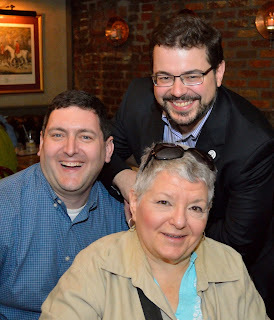
Where do you see Sherlockiana in 5 or 10 years from now?
Such an interesting question. The people and the book club discussions will always remain, though I see much more of its gatherings happening online - the pandemic spurred that move, and I don't think the trend will reverse. Some scion societies will return to in-person events, some will stay remote, and some will offer both types of events. This is a good thing - our virtual meetings of the Priory Scholars of New York City attracted people who were not local to the area, as well as many who might have been attending their first meeting, and it was a delight to have new people, new perspectives in our discussions.
A challenge I see coming is the cost - attending major events or building a collection or library can make this an expensive hobby. If we want the hobby to expand, diversify, and continue, I think that concern should be taken seriously. Or the message should be made clear - the only thing needed to be a Sherlockian is a curious mind and the free edition of The Complete Sherlock Holmes.
November 27, 2022
Interesting Interview: Heather Hinson
But she isn't just a local hero or someone who lurks in conversations on the web. No, Heather has started her own online discussion group, The Lion's Mane Literary Society, has had an ongoing series of articles in The Watsonian about important women in the Sherlockian Canon, and was a cornerstone author in The Monstrum Opus of Sherlock Holmes . She's also a key player in planning next year's Holmes in the Heartland conference. Have I missed something? Probably because this woman is everywhere! And this week, she's right here, so let's spend some time with Heater Hinson!
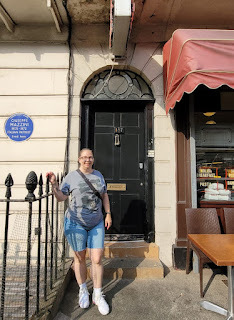
How do you define the word “Sherlockian”?
A Sherlockian is anyone who walks into the fandom of Sherlock Holmes and falls right down the rabbit hole. It doesn’t matter how they get here. If they are a fan of Sherlock Holmes, they’re a Sherlockian.
How did you become a Sherlockian?
I blame my father and Nicholas Rowe. In 1985, a movie came on HBO called Young Sherlock Holmes. My father had introduced me to "A Scandal in Bohemia" earlier that year and had given me a (very) brief rundown of the history of Sherlock Holmes. Enough of a history that I understood why the students hated Sherlock in the school, I understood the pipe and the deerstalker. And when the after-credit scene of the movie revealed that Professor Rathe was in fact Moriarty, I was giddy with excitement. Thus began my descent into the rabbit hole. I was stuck for a while but now the full fall is complete.
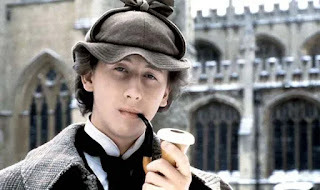
What is your profession and does that affect how you enjoy being a Sherlockian? I work in Medical Records at a local St. Louis hospital. It’s a Monday through Friday job which helps that I don’t need to take much time off I go with conventions and meetings. I work with medical terms, so it helps when I’m writing and need to figure out medical terms. Fun fact, there is a Dr. John Watson who is a physician at one of my hospitals, but I have not met him yet. I am silently amused when I run across his name in a chart.
What is your favorite canonical story? If you had asked teen me, I would have said “A Scandal in Bohemia” or the The Hound of the Baskervilles because those were two of the popular Holmesian stories that were constantly out in the public’s eye.
However, adult me had two favorite canonical stories, “The Adventure of the Copper Beeches” followed by “The Adventure of the Lion’s Mane.” I feel both stories are pushed aside for other popular ones, and I would love to see them get more attention.

Who is a specific Sherlockian that you think others would find interesting? Madeline Quinones! I feel like I’ve known her forever, even if it’s only been since the pandemic began. On top of being a member of the John H Watson Society, Madeline also co-runs and co-hosts a podcast called Dynamics of a Podcast the only Moriarty based podcast, she also runs a comic called The Adventures of Professor Moriarty which is basically the Professor and his loyal compatriot, Colonel Moran getting into all sorts of interesting situations. She also hosts a weekly Zoom meeting called Canonical Conversationalists that’s just Sherlockians getting together talking about everything. She has so many things going on, I don’t know how she has time to sleep!
What subset of Sherlockiana really interests you? I’m not sure it’s a subset, but I am fascinated in listening to the older Sherlockians talking about their experiences in Sherlockiana. At my first “non fandom” Sherlock Holmes convention, I listened to someone tell me stories of how she met and spoke with John Bennet Shaw as a young woman. I’ve heard stories during Canonical Conversationalists of how Sherlockian meetings and meets up were in the Seventies. There’s so much rich history in older generations that are slowly disappearing and it’s fascinating to me to hear the stories. My goal is to eventually sit down with groups of the older generations and listen to their stories over a beer or drink of choice. As someone well-versed in the fandom world, how does Sherlockian fandom compare to others that you're a part of? I came in backwards into the Sherlock Holmes fandom. First by a movie, then reintroduced by the resurgence of Holmes in the 2010’s. In my opinion, the Sherlockian fandom has two distinct groups, the devout media fandom, and the devout academic fandom. There is some meshing in between both, but a portion of the fandom is either in one or the other. Fandom itself has changed over the years but despite all the discontent in the Sherlock fandom, I would still say that now, it is much calmer than some of the other fandoms I’ve been in. I think it helps that there is both media and literature to fall back on. As the Sherlockian media ebbs and flows, the fandom always has the books. And now with all the stories finally public domain in 2023, I look forward to seeing what the fandom does with some of the newly freed titles!
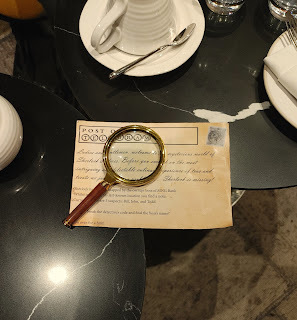
You've recently done some Sherlockian travelling! What are some highlights from your trips? I was finally able to go to London England and Edinburgh Scotland this past July and I made it a Sherlockian holiday! I stopped at all the touristy attractions like the Sherlock Holmes Museum, where we only visited the gift shop, and the Sherlock Holmes Pub, where I was able to take pictures of the front room they have displayed upstairs. Some of my main highlights was taking afternoon tea at the Sherlock Holmes Hotel, going into the St. Bartholomew’s Hospital’s small museum (and seeing the spot where Sherlock jumped from BBC’s “The Reichenbach Fall”) and doing The Game Is Now escape room.
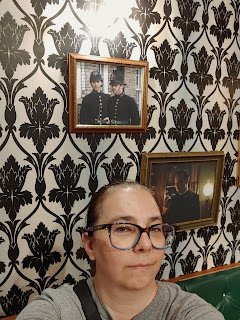
What book would you recommend to other Sherlockians? When I was working on my paper on the Women of Sherlock Holmes, I found the book From Holmes to Sherlock by Mattias Bostrom fascinating. I read it from cover to cover in about a week. Anyone wanting to read the history of the creation of Sherlock Holmes to the current year, should pick up this book and read it. If we’re talking about fiction books, I will never stop shouting into the Void about Theodora Goss’s The Extraordinary Adventure of the Athena Club book series. While not the main characters, Sherlock Holmes and John Watson are continual side characters that fit perfectly in the created world. Theodora Goss was a keynote speaker at the 2020 BSI Weekend and I will forever kick myself that I didn’t know until it was too late.
Where do you see Sherlockiana in 5 or 10 years from now? The popularity of the current Enola Holmes series and earlier this year, Audible’s Moriarty: The Devil’s Game makes me think that Sherlock Holmes isn’t going anywhere. There’s still rumors of Robert Downey Jr doing a third Sherlock Holmes movie, Snoop Dogg is rumored to be working on a Sherlock Holmes inspired series, as well as new stories being released. I fully expect Sherlockiana to continue well past five or ten years.
November 13, 2022
Interesting Interview: Phil Bergem
This week, Phil Bergem is out Interesting Interview. And I have to apologize up front. Phil might be one of the most delightful fellas out there, and I should have have interviewed him long before now. In fact, I was looking over the list of past interviewees and really thought I'd forgotten to list Phil because I couldn't imagine that I hadn't talked to him yet! So it's time to put right what once went wrong.
Phil is one of those guys you see at plenty of events, and he just radiates good vibes. I've been lucky enough to write a chapter for his next BSI Press project coming out in January, and he wrote an absolute corker of a piece for The Monstrum Opus of Sherlock Holmes connecting a classic Sherlockian mystery to a very creepy Conan Doyle tale. Phil has also overseen so many publications coming out of Minnesota, that I won't even try to list them because I will definitely miss something. But Phil isn't just a great writer and editor. In his answers below, his good nature shines through and he has that has that "bit tent" mentality that welcomes everyone. So enough telling you about how great of a guy he is. Let the great guy speak for himself!
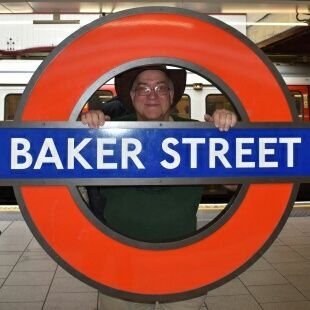
How do you define the word “Sherlockian”?
Anybody who wants to dig a bit deeper than the original stories, the movies or television series. We all come to Holmes in our own manner. The question is what a person does after the introduction. If someone watches Sherlock or reads The Adventures of Sherlock Holmes, says that they enjoyed it, but doesn’t go farther, they’re a fan. That’s all well and good, but I consider a Sherlockian to be a person who wants more. Whether that is reading the Writings on the Writings, learning about life in the Victorian era, producing artwork, or writing fan-fiction, as long as they wish to expand their interest and dig deeper, they’re a Sherlockian.
How did you become a Sherlockian?
When I was young, perhaps 9 or 10 years old, I was given some Sherlock Holmes stories to read. They didn’t take at that time. In the 1980s, when in my late 20s, I watched the Granada/Jeremy Brett series on television. I found them interesting enough that I bought a collection of the stories. I had recorded the episodes and when I compared the dialogue to the stories, I figured out that the best lines had been written by Conan Doyle and freely used in the scripts. This prompted me to go out and find other books by Conan Doyle. Eventually I found out about the local Sherlockian group, the Norwegian Explorers, and got more and more involved with them.
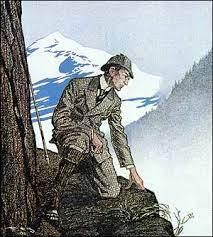
What is your profession and does that affect how you enjoy being a Sherlockian?
I work as a Civil Engineer for the Minnesota Department of Transportation. It does not affect my Sherlockian life, but my Sherlockian life has helped my work. With various writing, editing, and publishing projects, I have become very adept with Word and that helps me with reviewing and writing engineering documents.
What is your favorite canonical story?
“The Empty House.” In it, Watson describes, loosely, their walk from Cavendish Square to the Empty House across from Mrs. Hudson’s lodgings. When I annotated Out of the Abyss for the BSI Manuscript Series, I used maps from the period and came up with my own choice for their route. On a trip to England in 2018 I walked it. This intimate connection with the story adds to the enjoyment of it all.

Bernard Davies’s choice for the location of the “Empty House” in London (middle building).
Who is a specific Sherlockian that you think others would find interesting?
I hope that you do not mind me mentioning two people. One is Paul Thomas Miller of The Shingle of Southsea in Portsmouth. He has an amazing amount of energy and comes up with interesting projects. He is also the right kind of crazy, which I admire.
The other person is Julie McKuras. She is outgoing and enthusiastic. With her interests, talents, and supportive husband, she has accomplished a lot, had a number of great Sherlockian experiences, and met very many interesting Sherlockians. As a result, she can tell some great stories.
What subset of Sherlockiana really interests you?
I am fascinated by the Beeton’s Christmas Annuals, The Strand Magazine, and Conan Doyle’s family history.
I am fortunate that nearby Sherlock Holmes Collections at the University of Minnesota has four copies of the 1887 Beeton’s Christmas Annual. I was able to examine them closely and to compare conditions. I am also fortunate that I am able to take vacations to interesting places. On various trips I have searched out people and institutions that have one of the 1887 issues. Over the decades of my pursuit, I have seen and examined twenty of the thirty-four known copies.
The Annual was printed from 1860 until 1898. Issues for many years are rarer than for 1887, although of much less interest, and images of most of the covers are not available on the Internet. I have been working to get photographs of the covers and itemize the contents of all the other years. My intent is to someday develop a webpage to share my findings.
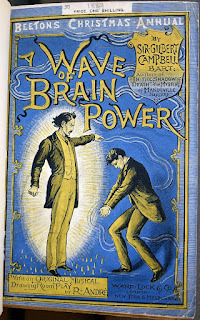 Cover for the 1889 Beeton’s Christmas Annual.
Cover for the 1889 Beeton’s Christmas Annual. As a stalwart member of The Norwegian Explorers of Minnesota, why do you think that region of the country has had such a strong contingency of Sherlockians over the years?
The cold, harsh winters.
Seriously though, we lucked out with the four founders of the group. One of them, E. W. McDiarmid, was the University of Minnesota Librarian. Through his involvement, and that of the Special Collections Curator, Austin McLean, they worked to build a significant enough collection of Sherlock Holmes materials that John Bennett Shaw decided to add his collection to it. The ties between the Explorers and the Collections were significant in attracting and retaining members. They, in turn, attracted other interesting people. Enough of the members are good at organizing, and have the right levels of energy, ideas, and enthusiasm, that we have been able to host well-received conferences and produce some good publications, including the popular Norwegian Explorers Christmas Annual. In my opinion, having the Sherlock Holmes Collections at the University of Minnesota has given the Norwegian Explorers a focal point to work with and to care about.
You've been associated with the BSI Manuscript Series for years. What are some fond memories you have of these projects?
I have been lucky to be allowed to transcribe and annotate the various Sherlock Holmes manuscripts for the series. In addition to annotating differences between various printings (first British and US periodical and book editions, and the iconic Doubleday Doran and the John Murray editions) I like to address things that were not covered by Baring-Gould or Klinger in their annotations. There is usually one finding in each book that I particularly love. Examples include finding a music release titled “Ionides of Alexandria” (The Wrong Passage (GOLD)), finding a photo of the 100-HP Benz which is mentioned (Trenches (LAST)), researching “that great forest” and Tudor period iron smelting (Deadly Harpoon (BLAC)) and Watson’s mention of tennis shoes and their use in the late 1880s (The Worst Man in London (CHAS)). It’s fun to explore these tidbits and even more fun to share them.
What book would you recommend to other Sherlockians?
Again, I’d like to offer two. The first is From Holmes to Sherlock by Mattias Boström. It wonderfully outlines the Sherlockian movement from the origins to current day (or when it was published in the US in 2017) and gives a well-written and lovingly researched account of the history of Sherlockiana and how the present interest in Sherlock Holmes came to be.
The second book is a pastiche that I enjoyed — Holmes Volume 1: Enigma, Detective, Boro Lad by Melvyn Small (recently re-released as The Accidental Detective). It is set in present times in northeastern England, the area where I lived during my high school years. This Holmes is a cross between Jonny Lee Miller and Benedict Cumberbatch, speaking with the curse-filled lingo of a Middlesbrough lad. While I was attracted by the setting, I enjoyed the stories and relationship between Watson and Holmes. I think it deserves some additional exposure. There are three books in the series, the other two being The Song of the Swan and Three Pint Problems.
Where do you see Sherlockiana in 5 or 10 years from now?
I think that with our collective experiences of meeting virtually over the past three years, that method will continue even as we start meeting in person again. A result, I expect, will be more and more intermingling of Sherlockians across the US and between nations. I hope that there is a continuing influx of people attracted by Enola Holmes, the upcoming Robert Downey, Jr. movie, and the steady stream of new pastiches being printed. We need younger members and more diversity among the membership.
Holmes and Watson are a convenient, established way of telling interesting stories with an always-popular underlying message of friendship. I believe that there will continue to be a strong interest in Sherlockiana as new material is written and people find their way back to the original stories.
November 6, 2022
The Disposition of the Child [COPP]
Reading "The Copper Beeches" on this Fall weekend made certain things stick out. Every mention of the titular trees made me look around to appreciate how vibrant the leaves are in my neighborhood. And Halloween being right around the corner made me think of werewolves every time Carlo was mentioned (If you're unfamiliar with that argument, I strongly recommend checking out Ray Betzner's essay "Whatever Happened to Baby Rucastle" in The Monstrum Opus of Sherlock Holmes.)
But more importantly to this teacher's mind was another autumnal constant: Parent/Teacher Conferences.
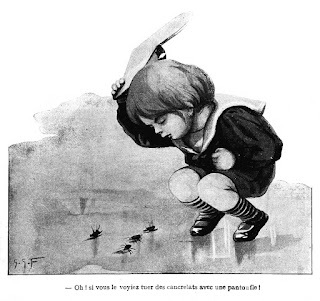 Now, what do Parent/Teacher Conferences have to do with "The Copper Beeches" you might ask? Let me quote Sherlock Holmes to explain that for you:
Now, what do Parent/Teacher Conferences have to do with "The Copper Beeches" you might ask? Let me quote Sherlock Holmes to explain that for you:"My dear Watson, you as a medical man are continually gaining light as to the tendencies of a child by the study of the parents. Don't you see that the converse is equally valid. I have frequently gained my first real insight into the character of parents by studying their children. This child's disposition is abnormally cruel, merely for cruelty's sake, and whether he derives this from his smiling father, as I should suspect, or from his mother, it bodes evil for the poor girl who is in their power."
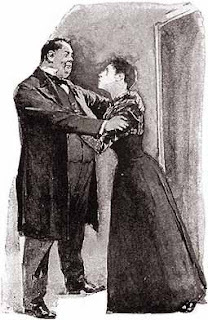
Let me be clear, I'm not claiming that I have students who spend their lives alternating "between savage fits of passion and gloomy intervals of sulking" or that giving pains to any creatures weaker than themselves seems to be an idea of amusement.
But Holmes's diagnoses of the apple not falling too far from the tree would ring true to any teacher. The talkative kids in class? Those are the conferences that I worry will run overtime with the parents. The kids who want to please and are wonderfully behaved? Those conferences will be with some delightful folks. The intellectually curious kids will likely be repped by folks who have great questions of their own when we talk. I could go on and on....
Other children in the Canon prove Holmes's point as well. Jack Smith, the pilot Mordecai Smith's young son comes to mind. He shows an entrepreneurial spirit in The Sign of Four, just like his father who is not opposed to working with some shady folks for the right price.
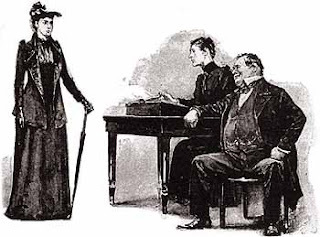
Early on in "The Copper Beeches," Jephro Rucastle describes his son as "a child who may some day play a considerable part in the history of the country" and a few paragraphs later laughed at how vicious Edward was toward cockroaches. Do we see parallels in the father's own nature? The way he speaks to Violet Hunter once she is in his employ, the way he treats his daughter, and how he speaks to Holmes at their meeting shows that the man feels that he is on a higher plane that some folks. And it's very clear that Rucastle has a violent streak in him just like his boy.
Growing up, was Jephro Rucastle an "utterly spoiled and so ill-natured a little creature" as his own son is? If Sherlock Holmes and Parent/Teacher Conference data have anything to say, it's pretty safe to say that both Rucastles follow similar paths. But the traumatic closing events of "The Copper Beeches" may not have saved only Violet Hunter and Alice Rucastle. That fateful night may have altered the trajectory of Edward Rucastle's life as well and kept him from turning into his father. And for that, the mice, birds, and little insects of Hampshire should be glad.
October 30, 2022
Interesting Interview: Johanna Draper Carlson
Looking back, Johanna Draper Carlson has only been a part of my Sherlockian social circle for a year or so but she feels like someone who's been an evergreen member of the community. Johanna's online presence just elevates everyone around her. And the perspective she brings to every conversation is a great mix of knowledge and fandom, bridging two big groups in our hobby.
I got to meet Johanna in-person when we were at the Celebration of Sherlock Holmes conference in Chicago last May. Johanna is such a delightful person to hang around with! And she contributed a wonderful piece to The Monstrum Opus of Sherlock Holmes so I can now say she is also a delightful person to work with! And after reading this week's interview, I bet you'll be thinking the same thing.
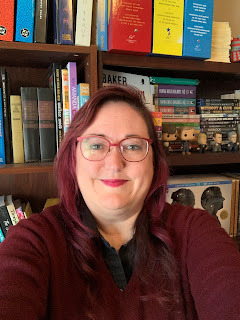
How do you define the word “Sherlockian”?
I generally try not to. “Someone who likes Sherlock Holmes,” I suppose, would work for me. Whatever version, whatever format, whatever medium. I love that we’re continuing to get closer to a world where there’s a Sherlock out there for everyone, and I enjoy talking to people about which versions they like and why.
Some of that is due to past experiences. I spent a couple of decades in comic fandom, where a few bad apples made things difficult. I’ve had to pass a trivia test to demonstrate I have enough knowledge to be considered a real fan, and I have had to ignore insinuations that women are “fake geek girls.” As a result, I can be sensitive to perceived gatekeeping. If someone says they’re a fan, or a Sherlockian, of whatever variety, that’s fine by me.
I love Sherlock Holmes in part because there are so many variants and flavors and portrayals, and I enjoy learning about why he’s interesting to others, whether they’re traditional, prose-only Sherlockians or media fans or creating their own stories. When they have a perspective different from mine, all the better — that’s more for me to learn from.
How did you become a Sherlockian?
My origin story has three parts. The first is that I read the Baring-Gould Annotated Sherlock Holmes as a kid. I’ve always been interested not just in stories, but how the stories are made, and the behind-the-scenes. The annotations helped me understand basics, like how much money was worth then compared to now, but also that there were some very devoted fans of this character. (I’m still amused by the fixation on the weather in order to “correct” Watson. Having worked for a comic book company, my understanding of how serial stories are created, and the “just make the deadline” approach I often saw, likely colors my analysis.)
The second part was moving to Madison, Wisconsin, and discovering the Notorious Canary-Trainers, the local scion society, shortly thereafter. They’re a wonderful group that gathers monthly to discuss a story. I’ve come to understand that they’re rather low-key in comparison to some — no dues, no publications, no set agenda — but most importantly, the people were friendly. Having a group to meet with regularly was encouraging, particularly during the past few years, when we met online.
Speaking of which, the third part is the pandemic lockdown. I rediscovered the BBC Sherlock during that time, and then met a bunch of fans of that show virtually. That reawakened my interest in media appearances of the character. I also visited various online gatherings, which gave me a good overview of the diversity of Sherlockians. And how welcoming they could be!
The welcomes extended to opportunities to write. I queried both the I Hear of Sherlock Everywhere blog and Sherlock Holmes Magazine, which resulted in my reviewing Sherlock-related books for the blog and contributing articles to the magazine from issue #5 on.
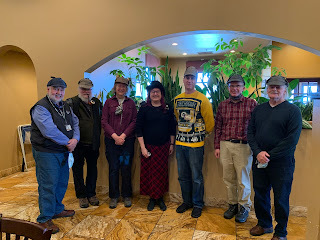
What is your profession and does that affect how you enjoy being a Sherlockian?
My day job is Software Development Manager. That gives me a familiarity with tech, which means I could set up our society mailing list and help with virtual meetings.
My long-lasting other occupation has been writing about comic books, manga, and graphic novels. I launched my website ComicsWorthReading.com in 1999, and by my reckoning, although it’s not as active these days, it’s the longest-running independent review site online that covers all genres and formats of comics, including graphic novels, independent press, alternative, manga, graphic memoir, superhero comic books, and mainstream works, as well as related media.
Also during the pandemic, some other comic journalist friends were regularly gathering online. I told them how much I was enjoying rediscovering my love of Sherlock Holmes, and they encouraged me to combine the two interests. I launched SherlockComics.com on February 21, 2022, and that has led to being invited to make presentations and conference appearances on the subject, which I very much enjoy.
My technical background means I know how to create a website, and my time as a comic journalist means I know how to tell other people about it. I discovered that there were various sites online with lists of Sherlock Holmes in comics, but none of them were what I was looking for, which was more specific.
I wanted to know which appearances were stories, and which merely cameos. Were they using a traditional portrayal, or did they take another approach? Telling original stories or canon rework? And how could I find these stories without hunting down back issues?
That’s why I created SherlockComics.com. It’s intended to be an index to comic-format stories about Sherlock Holmes and related characters in comic books, manga, and graphic novels. My focus is on stories others can relatively easily find and read, if interested, so I talk more about collections (TPBs), reprints, and books in print than collectibles or cameo appearances. I also try to give some guidance as to who might like which stories without giving away too many spoilers.
Oh, one other thing about my profession — I can’t deny that making a good living makes it easier to visit conferences and gatherings and meet other Sherlockians. So long as I can get the time off.
What is your favorite canonical story?
My scion name comes from “The Speckled Band,” and that’s a classic. My favorite character is Mycroft Holmes, which means “The Bruce-Partington Plans” should rank highly. I’m going to pick, though, “The Blanched Soldier,” because it’s so petty, which makes it fascinating to me.
I think many of us are inspired by the close relationship between Holmes and Watson, one of the immortal fictional friendships. Reading a story where Holmes alternates between passively aggressively insulting his former partner and obviously missing him is so emotionally telling. He’s sentimental, darn it, and that reveals a side of the character that’s not as well-known.
Plus, this is the story that gives us two wonderful quotes: “deserted me for a wife” and the one we all know about “however improbable.”
(My very favorite story is “A Study in Pink” because it’s a terrific example of how to keep these stories alive for new generations.)
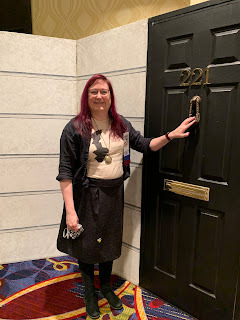
Who is a specific Sherlockian that you think others would find interesting?
I thought I was walking on eggshells with the first question! This one is tricky for me. I’ve met so many wonderful people in the Sherlockian world. But I think my favorite Sherlockian is Dorothy L. Sayers, because she was so inspired she created another of my favorite detectives, Lord Peter Wimsey. (I finally got an offshoot of the Canary-Trainers to start reading the novels so I would have someone to discuss them with.)
What subset of Sherlockiana really interests you?
I should probably say the comics, as I think that’s why you asked for the interview (and thank you very much for that!), but to broaden that a bit, what really interests me is seeing how many stories have been inspired by the Great Detective. Whether you call them fic, pastiches, sequels, or fanfiction, I love the diversity of subject matter and the many outstandingly creative ideas people come up with.
Particularly with fic, it’s a brilliant way to find so many unusual concepts. Someone’s got a hobby or an interest or an opinion, and they combine it with Holmes, Watson, and their supporting cast, and a story results.
One of my personal favorite themes is time travel, as when an 1895 Holmes winds up in present day, or a modern John Watson visits the past (especially when one used the setup Connie Willis created, as seen in To Say Nothing of the Dog). One I found particularly enjoyable had a past Holmes demanding of Mycroft that he use the secret government time machine to send Watson to the future to be cured of cholera, where he was treated by modern Watson.
Those kinds of stories are great for exploring what makes the characters universal and timeless as well as how they can continue to be relevant.
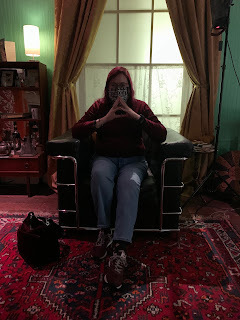
How have you seen Sherlockian comics change over the years?
That’s a tricky question to answer, as I am coming to them from a historical, looking-back perspective — I only started paying attention to them a year or so ago. There are plenty of people who’ve been following them as they came out, and who have much more extensive collections.
I focus on stories about Sherlock Holmes, where he (or she or a related character) is a prominent part of the goings-on. Since starting, I have had the pleasure of meeting people who have gone for the deep dive, picking up anything that had a one-panel cameo or even just a deerstalker. That’s dedication!
But looking back, it appears to me trends in Sherlockian comics mimic trends in the greater comic industry. We see an explosion of young reader versions of The Hound of the Baskervilles as schools and libraries begin realizing how educational comics can be. We see a rise in more diverse portrayals — including versions starring people of color and women — when crowdfunding allows people to more easily find audiences directly and put out more personal interpretations.
Most obvious are the media connections, as we see more action-adventure takes when the Downey/Ritchie movies are out, for example. Sherlock Holmes is such a well-known character that tracing the various approaches — in both content and format — taken with him over the years shows in microcosm changes in the comic industry, from expanding audiences to reprint viability.
What are some favorite Sherlockian comics that you've come across?
My favorite, for the humor and the use of two sets of beloved characters, is Muppet Sherlock Holmes. Sadly, due to licensing changes, it is long out of print. And because it was a kids’ comic, lots of the copies got read to pieces or otherwise destroyed. Which is a darn shame.
I adore the game-playing in the choose-your-own-path Graphic Novel Adventures put out by Van Ryder Games. There are six volumes now, each with multiple cases, and I think I’ve maybe solved a total of two across the series.
I really want someone to reprint the two-part Marvel Preview Hound of the Baskervilles from 1976, because it’s moody and theatrical and gorgeous.
I enjoy the Shirley & Jamila series because it provides hope for the future, with two young women detectives helping out their classmates. As you’ve likely gathered by now, I like seeing people take these characters and their abilities and involvements and find new ways to tell stories with them.
And for pure laughs, Ghostbees’ Consulting Detectives webcomic is a brilliant portrayal of the classic characters with a modern-day sensibility, making them ever more human.
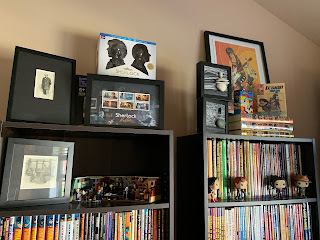
What book would you recommend to other Sherlockians?
The book I come back to each month (coordinated with our society’s reading schedule) is About Sixty: Why Every Sherlock Holmes Story Is the Best, edited by Christopher Redmond. Some of the essays provide new insight, some seem to be making the case that any Holmes is great, but I usually learn something new from it. Plus, now that I’ve met some of the contributors, it’s fun to see who wrote what.
Where do you see Sherlockiana in 5 or 10 years from now?
I’m excited, sooner than that, to see what happens after all the Arthur Conan Doyle stories become fully public domain in 2023. I know several people waiting to launch creative projects at that point. Hopefully that leads to a blossoming of interesting works inspired by the originals.
In the longer run, I have strong hopes that we will continue to see more acceptance of varying types of Sherlockians and different sources of interest. Fans these days are more likely to have come from the media versions, and it’s obvious to many that new blood is necessary to avoid societies aging out and disappearing. I hope we can continue to reach out to new people and include them in, just as Sherlockians have been welcoming to me.
October 22, 2022
Some Monstrous Conspiracy [NAVA]
The truth is out there. And now it can finally be told.
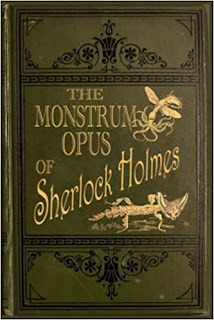
Through no fault of my own, I somehow got roped into shining a light into the darkest recesses of the Sherlockian Canon. I'm a humble editor/proofreader, so how I ended up working with Nathaniel Barker-Harris, the great-great-grandsomething of Cecil Barker from Surrey is beyond me.
Okay, let me back up. You might be wondering what all of this is about. I posted last week on Twitter and Facebook about a new book I co-edited with Brad Keefauver and Nathaniel Barker-Harris, The Monstrum Opus of Sherlock Holmes.
The Monstrum Opus of Sherlock Holmes is a collection of 17 essays that pull back the curtain on some pretty big cover-ups (some might even say conspiracies) to hide the true nature of some seriously monstrous interactions that Holmes and Watson had during their years of active service. I know, "No ghosts need apply." And yeah, there are a million books out there that pit Holmes against Dracula or other vampires, but this isn't a pastiche or some book filled with spirits contacting the living.
The Monstrum Opus of Sherlock Holmes collects some pretty prominent names in Sherlockiana and some exciting new ones as well. And in it they all make some serious arguments that will make you rethink some of the stories that we love so much. At least they did for me. Just check out the contributor list:
Heather Hinson
Johanna Draper-Carlson
M.K. Wiseman
Phil Bergem
Claire Daines
Nick Martorelli
Luke Poling
Mary O'Reilly
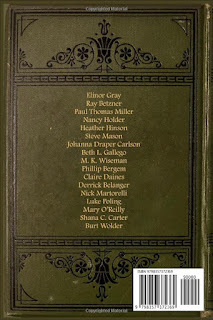
See? Quite a list! I've interviewed most of these folks and never knew until working on this project that they had such intimate knowledge of this monstrous conspiracy. Did they know that others out there had such information as well? Had Nathaniel Barker-Harris connected them with one another? I don't know, but I do know that after working on The Monstrum Opus of Sherlock Holmes, I've spent some time looking into the abyss of questioning what I thought I knew.
Maybe there are more folks out there who know more than they are letting on. But for now, I'm content to share these 17 authors with the world and let the world decide what to do with all of this new knowledge....
October 16, 2022
Interesting Interview: Aaron Rubin
To see Aaron Rubin is to immediately be taken in by his sense of style. Aaron has been studying the history of art, fashion, and jewelry for years and has lectured on these topics throughout Los Angeles and San Francisco. He also wrote an article in a recent issue of The Baker Street Journal reminiscing about his early years as a Sherlockian and being possibly the youngest person to recreate Holmes and Watson's sitting room.
Aaron is one of the newest batch of Baker Street Irregulars from this year's class and I've been very lucky to get to know him over the course of this year through emails after we were invested. And through this week's interview, I got to learn a little more about him. I love knowing that there was a family connection to this hobby and that he has been involved with his home scion since the age of TWELVE! If you already know Aaron, you know you're in for some words from a really nice guy, and if you haven't met him yet, get ready to learn about someone you're going to want to get to know better!
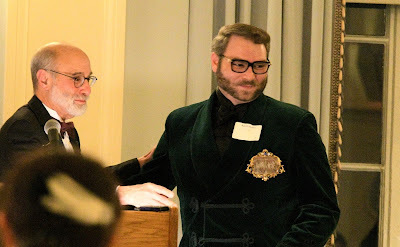
How do you define the word “Sherlockian”?
I believe that a Sherlockian has read the Canon at least once, has the inclination to read it all again, and is at least familiar with the concept of the Great Game (or the Higher Criticism) whether they practice it or not. The road to becoming a Sherlockian can start anywhere, but no matter how devoted you are to the Basil Rathbone films or the Benedict Cumberbatch series or to any series of pastiches, if you haven’t read and digested the entire Canon then you’re really just a Sherlock Holmes fan. That is, a fan of the character named “Sherlock Holmes.” And there’s nothing wrong with being a fan, but a Sherlockian has pushed past fandom into something else entirely. Obsession, I suppose. But whatever that something else is, it should be built on the foundation of the original source material.
How did you become a Sherlockian?
I was extremely fortunate to have Sherlock Holmes introduced to me by my sixth grade teacher. I was instantly hooked, and I was blessed to have parents who could see that my new passion was more than a fleeting interest. My mother was something like a Sherlockian in her youth, and she did the research to find The Curious Collectors of Baker Street and signed us up for membership. Being part of a group of exceptionally friendly and welcoming Sherlockians, at such a young age (I was twelve), meant that I had the support and encouragement to pursue this passion all through my awkward teen years, high school, college, and beyond.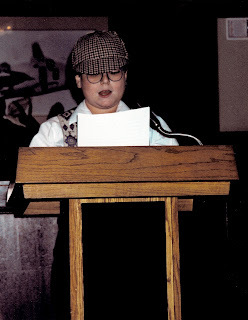 Age twelve, delivering my first “scholarly” paper at my first Curious Collectors of Baker Street meeting.
Age twelve, delivering my first “scholarly” paper at my first Curious Collectors of Baker Street meeting.What is your profession and does that affect how you enjoy being a Sherlockian?
In my previous life I worked at a major auction house for about nine years. I spent most of that time assisting the Fine Jewelry department and the Entertainment Memorabilia department. I can’t recall any Sherlockian overlap in my work with jewelry (although I was always hunting for an emerald snake ring for my collection), but Holmes did pop up occasionally in the world of Entertainment Memorabilia. I won’t say too much, but it’s pleasing to know that Basil Rathbone (in 1939) and I (circa 2013) wore the same sized jacket!
What is your favorite canonical story?
I recently reread The Valley of Fear and enjoyed it so thoroughly that I was surprised. I probably hadn’t read it in over 20 years and had only a vague memory of finding it rather dull. Mea culpa! Maybe I just didn’t “get it” back then. I suppose it’s a favorite at the moment. For sentimental reasons I always say that “A Scandal in Bohemia” is my favorite.
Who is a specific Sherlockian that you think others would find interesting?
Maggie Schpak! Maggie’s career in film and television props, jewelry, and costume design is endlessly fascinating. And every marvelous object she has made comes with its own equally marvelous story or humorous anecdote. For decades she has supplied bespoke Sherlockian medals for the Curious Collectors of Baker Street annual medal quiz. And countless tiaras, brooches, stickpins, earrings, etc. (all either explicitly Sherlockian or Victorian-inspired) have been prominent highlights of fund-raising auctions and raffles for both the CCOBS and the BSI. She is a font of amazing stories, great humor, technical expertise in an assortment of fields, a dedicated Sherlockian since childhood, and one of my personal style icons. I guess I tend to assume that everyone knows Maggie, but if you don’t, you should.
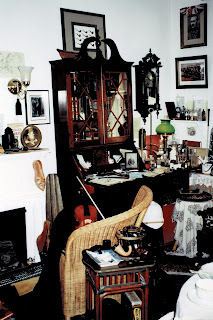 Just a typical teenager’s bedroom.
Just a typical teenager’s bedroom. What subset of Sherlockiana really interests you?My most ambitious Sherlockian endeavor was the transformation of my childhood bedroom into a re-creation of the sitting room at 221B Baker Street. I should clarify that I did this while still using it as my bedroom. I was limited by space, resources, concessions to practicality, and my as-yet-undeveloped knowledge of the period and antiques. But I dove into that project with all the zeal that one might expect from a teenage Sherlockian.
For my birthday one year I asked for an entire fireplace! Then I discovered that an antique sideboard worked just as well for holding clothes. And my bed could be turned into a reasonably convincing settee. I made it work, and the room evolved in stages over a period of about five or six years until the necessities of a twenty-first century adult lifestyle came crashing in and ruined the fantasy.
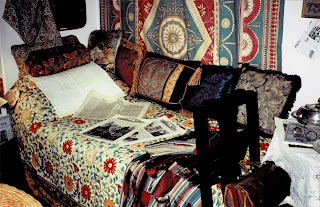 When your parents won’t let you sleep on an antique sofa, you make do with what you have.
When your parents won’t let you sleep on an antique sofa, you make do with what you have. But although my sitting room is long-since disassembled, I have never lost my passion for Sherlockian room re-creations. There are certainly enough of them around the globe to classify them as a subset of Sherlockiana. Creating these spaces (usually interpretations of the famous sitting room) is like playing the Great Game on the highest level, and I admire anyone who attempts it.
Generally speaking, the approach to this Herculean labor falls into one of two categories. There are those who want to cram a room full of as many Canonically-listed or implied artifacts (whether they would/should be in the sitting room or not) and then furnish the space around these items; and then there are those who attempt to create an authentic period room, meticulously building a late Victorian interior and introducing Sherlockian/Watsonian trappings with an eye to making the space believable. I prefer the latter approach and, if I were ever to have the space and money required, would love to try the project again from this angle. But any manner of re-creation (from tiny miniatures to full-scale rooms) is always a magical treat!
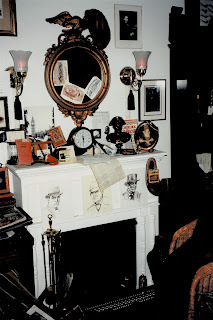 Just a typical teenager’s bedroom.
Just a typical teenager’s bedroom. You are well-known in Sherlockian circles for your fashion-sense. How has that enhanced how you enjoy our hobby?Am I? I’m flattered! Here the link with Sherlock Holmes is concrete, but the other way around. Being a Sherlockian gave me an avenue to explore and develop my interest in fashion. The CCOBS has always been blessed with a hefty contingent of historical re-enactors, dancers, and costumers. The club’s annual Gasfitters’ Ball was the history-immersive highlight of my year, but all of our events were (and are) excuses to don period costume. Consequently I went from being a schlubby teenage nerd in a t-shirt to being a teenage nerd in a top hat, white tie and tails, and I never looked back!
From there my tastes moved chronologically from the 1890s to the present day, and I have finally settled into a “look” of my very own. I rarely wear full period costumes anymore but I do wear frock coats and capes as often as possible! Holmes may also have been responsible for revealing my then-latent interest in jewelry. Now I am rarely seen without a brooch, ring, or other doodad, but it all began with scion society pins and quiz medals!
As someone who has been a Sherlockian since you were a kid, how has your interest in Sherlockiana adapted over time?
As is the case with so many of us, my passion for Holmes manifested as the “collection mania in its most acute form.” When I was just starting out on this journey I voraciously acquired any and every Sherlockian item I could get my hands on. Every book, monograph, tchotchke, artwork, matchbook, or scrap of newspaper I could find – as long as it had at least a deerstalker on it - I had to have it. Now I find I am much more selective and deliberate about my acquisitions. This is largely because, as I got older, I started collecting SO many other things beyond Sherlock Holmes. So space and finances had to be shared among my many passions and hobbies. There are plenty of Sherlockians who have devoted every square inch of available space in their life to the storage and display of Sherlockiana, and I probably used to think that I was destined to be one of them. I admire those people but I’m glad that I have found a way to maintain a healthy Sherlock-Life Balance.
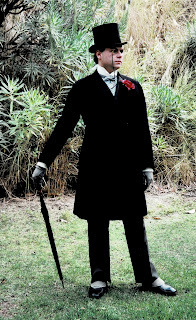 About age twenty, dressed for the CCOBS annual Silver Blaze Handicap at the Santa Anita Park.
About age twenty, dressed for the CCOBS annual Silver Blaze Handicap at the Santa Anita Park. What book would you recommend to other Sherlockians?It’s a cliché, I know, but Baring-Gould’s The Annotated Sherlock Holmes is an essential. As a kid it was my first exposure to playing the Great Game, and those annotations confounded me, vexed me, inspired me, and made me want to read the entire Canon to get to the bottom of things!
Where do you see Sherlockiana in 5 or 10 years from now?
“Sherlock Holmes” the character isn’t going anywhere. There will always be new renditions and interpretations of him (or her, or them) in print and on screens both big and pocket-sized. And as long as the character thrives then (hopefully) so will Sherlockiana. It doesn’t matter how you find Holmes, as long as you do. Of course I hope that people will continue to love the character so much that it compels them to read the original stories and join a club!


